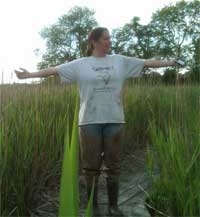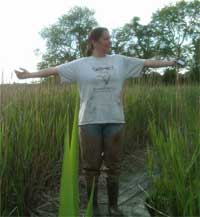 Kingston resident to study invasive species in Czech Republic
Kingston resident to study invasive species in Czech Republic
KINGSTON, R.I. – June 1, 2011 – Laura Meyerson, associate professor of natural resources science at the University of Rhode Island, has been awarded a Fulbright Fellowship grant to conduct research at the Institute of Botany in Průhonice and Charles University in Prague, Czech Republic, during the 2011-12 academic year.
“I’m thrilled! It’s a prestigious and highly competitive honor, and it will help me a great deal with my research,” Meyerson said. “This is an opportunity to become part of a larger network of U.S. scholars who are studying internationally. Once you’re a Fulbright, you’re a Fulbright for life.”
A resident of Kingston, Meyerson studies invasive species and will spend her time in Prague investigating the relationship between a plant’s genome size and its propensity to become invasive.
“If a plant has a large genome, we hypothesize that it may be less able to adapt to new environmental conditions and therefore is less likely to move into new areas and become invasive,” she explained. “But those plants with smaller genomes may change and adapt more easily, which could result in greater invasive potential.”
Meyerson will focus her research on Phragmites australis, a plant that grows throughout a broad geographic range around the world and can live in a wide variety of habitats. The Czech Republic is in the center of its native range in Europe, so the URI scientist will spend time collecting samples of it in Europe and Russia to compare the genome size of native varieties with that of invasive varieties. She will use a high-tech device called a flow cytometer at Charles University to determine the genome size of her samples.
She also plans to establish what she calls a common garden in Prague that will allow her to bring plants from elsewhere and grow them under the same environmental conditions. “That way we can attribute any differences we find in them to genetics rather than to environmental variability,” she said.
“What’s exciting about this project is that this method could be a potential screening tool for invasiveness; it could be a new tool in our toolbox,” Meyerson said. “If someone is considering bringing a new plant into the country, it could be tested for its potential invasiveness.”
Meyerson has been studying Phragmites and other invasive plants for most of her career. She was the first to demonstrate that native and introduced species of Phragmites can hybridize. And this month she began a National Science Foundation-funded study to detect the different levels of herbivory on Phragmites growing at different latitudes. For this study, she will be monitoring populations of the invasive plant growing along transects extending from Canada to Florida and from Norway to Morocco.
The Fulbright Program is the flagship international educational exchange program sponsored by the U.S. government and is designed to increase mutual understanding between the people of the United States and the people of other countries. Recipients of Fulbright grants are selected on the basis of academic or professional achievement, as well as demonstrated leadership potential in their fields. The program operates in over 155 countries worldwide. Meyerson is one of about 1,100 U.S. faculty and professionals who will travel abroad through the Fulbright U.S. Scholar Program this year.
Since its establishment in 1946 under legislation introduced by the late U.S. Senator J. William Fulbright of Arkansas, the Fulbright Program has given approximately 300,000 students, scholars, teachers, artists, and scientists the opportunity to study, teach and conduct research, exchange ideas and contribute to finding solutions to shared international concerns.

